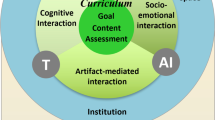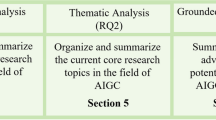Abstract
As more states in the USA require elementary schools to offer computer science (CS) education, teachers are expected to master the knowledge and skills to teach CS by integrating computational thinking (CT) into content areas. This study presented a research-practice partnership approach to support elementary teachers in a local school district with CT integration. Professional development (PD) followed the technological, pedagogical, and content knowledge (TPACK) framework, and three elementary teachers’ PD and classroom implementation experiences were examined and reported as a multiple case study. Interviews, observations, and teacher artifacts and reflections were collected and analyzed. The cross-case analysis revealed that the teachers (1) had an improved understanding of how CS/CT connects with content areas and how to make alignments across content standards, (2) demonstrated concrete strategies for designing and implementing CT-integrated instruction with various coding tools, and (3) provided students with engaging and inclusive learning experiences using a range of pedagogies. The paper discussed the implications for CS education at the elementary level.










Similar content being viewed by others
Availability of Data and Materials
The datasets generated during and/or analyzed during the current study are available from the corresponding author on reasonable request.
References
Alabama State Department of Education. (2018). Alabama Course of Study: Digital Literacy and Computer Science. Retrieved September 1, 2022, from https://www.alabamaachieves.org/wp-content/uploads/2021/03/Final-2018-Digital-Literacy-and-Computer-Science-COS-5-14-19.pdf
Archer, A. L., & Hughes, C. A. (2010). Explicit instruction: effective and efficient teaching. Guilford Publications.
Borowczak, M., & Burrows, A. C. (2019). Ants go marching—integrating computer science into teacher professional development with NetLogo. Education Sciences, 9(1), 66.
Brennan, K., & Resnick, M. (2012, April). New frameworks for studying and assessing the development of computational thinking. In Proceedings of the 2012 annual meeting of the American educational research association, Vancouver, Canada (Vol. 1, p. 25).
Coburn, C. E., Penuel, W. R., & Geil, K. E. (2013). practice partnerships: A strategy for leveraging research for educational improvement in school districts. William T. Grant Foundation.
Computer Science Teachers Association (CSTA). (2017). Computer science standards. Computer Science Teachers Association. Retrieved September 1, 2022, from https://www.csteachers.org/page/about-csta-s-k-12-nbsp-standards
CSforALL. (2016). K-12 Computer Science Framework. Retrieved September 1, 2022, from https://www.csforall.org/projects_and_programs/k-12-computer-science-framework/
del Olmo-Muñoz, J., Cózar-Gutiérrez, R., & González-Calero, J. A. (2020). Computational thinking through unplugged activities in early years of Primary Education. Computers & Education, 150, 103832.
Doukakis, S., & Papalaskari, M. A. (2019, September). Scaffolding technological pedagogical content knowledge (TPACK) in computer science education through learning activity creation. In 2019 4th South-East Europe Design Automation, Computer Engineering, Computer Networks and Social Media Conference (SEEDA-CECNSM) (pp. 1–5). IEEE.
Doukakis, S., Psaltidou, A., Stavraki, A., Adamopoulos, N., Tsiotakis, P., & Stergou, S. (2021). Measuring the technological pedagogical content knowledge (TPACK) of in-service teachers of computer science who teach algorithms and programming in upper secondary education. arXiv preprint arXiv:2105.09252.
Giannakos, M. N., Doukakis, S., Pappas, I. O., Adamopoulos, N., & Giannopoulou, P. (2015). Investigating teachers’ confidence on technological pedagogical and content knowledge: An initial validation of TPACK scales in K-12 computing education context. Journal of Computers in Education, 2, 43–59.
Hestness, E., Ketelhut, D. J., McGinnis, J. R., & Plane, J. (2018). Professional knowledge building within an elementary teacher professional development experience on computational thinking in science education. Journal of Technology and Teacher Education, 26(3), 411–435.
Israel, M., Liu, R., Yan, W., Sherwood, H., Martin, W., Fancseli, C., ... & Adair, A. (2022). Understanding barriers to school-wide computational thinking integration at the elementary grades: lessons from three schools. In Computational Thinking in PreK-5: Empirical Evidence for Integration and Future Directions (pp. 64–71).
Jang, S. J., & Chen, K. C. (2010). From PCK to TPACK: Developing a transformative model for pre-service science teachers. Journal of Science Education and Technology, 19, 553–564.
Kafai, Y. B., & Burke, Q. (2015). Constructionist gaming: Understanding the benefits of making games for learning. Educational Psychologist, 50(4), 313–334.
Kalelioglu, F., Gülbahar, Y., & Kukul, V. (2016). A framework for computational thinking based on a systematic research review. Baltic Journal of Modern Computing, 4(3), 583.
Kapor Center. (2021). Culturally responsive-sustaining CS Education. Retrieved September 1, 2022, from https://www.kaporcenter.org/wp-content/uploads/2021/06/1_CRCSFramework-Report_v7_for-web-redesign-.pdf
Kennedy, A. (2005). Models of continuing professional development: A framework for analysis. Journal of in-Service Education, 31(2), 235–250.
Ketelhut, D. J., Mills, K., Hestness, E., Cabrera, L., Plane, J., & McGinnis, J. R. (2020). Teacher change following a professional development experience in integrating computational thinking into elementary science. Journal of Science Education and Technology, 29(1), 174–188.
Koehler, M., & Mishra, P. (2009). What is technological pedagogical content knowledge (TPACK)? Contemporary Issues in Technology and Teacher Education, 9(1), 60–70.
Kong, S. C., Lai, M., & Sun, D. (2020). Teacher development in computational thinking: Design and learning outcomes of programming concepts, practices and pedagogy. Computers & Education, 151, 103872.
Kopcha, T. J. (2012). Teachers’ perceptions of the barriers to technology integration and practices with technology undersituated professional development. Computers & Education, 59(4), 1109–1121.
Lachner, A., Fabian, A., Franke, U., Preiß, J., Jacob, L., Führer, C., ... & Thomas, P. (2021). Fostering pre-service teachers’ technological pedagogical content knowledge (TPACK): a quasi-experimental field study. Computers & Education, 174, 104304.
Lee, I., Martin, F., Denner, J., Coulter, B., Allan, W., Erickson, J., ... & Werner, L. (2011). Computational thinking for youth in practice. Acm Inroads, 2(1), 32–37. https://doi.org/10.1145/1929887.1929902
Leonard, J., Mitchell, M., Barnes-Johnson, J., Unertl, A., Outka-Hill, J., Robinson, R., & Hester-Croff, C. (2018). Preparing teachers to engage rural students in computational thinking through robotics, game design, and culturally responsive teaching. Journal of Teacher Education, 69(4), 386–407.
Luo, F., Antonenko, P. D., & Davis, E. C. (2020). Exploring the evolution of two girls’ conceptions and practices in computational thinking in science. Computers & Education, 146, 103759. https://doi.org/10.1016/j.compedu.2019.103759
Luo, F., Israel, M., & Gane, B. (2022a). Exploring elementary students’ computational thinking: A learning trajectory perspective. ACM Transactions on Computing Education, 22(2), 1–26. https://doi.org/10.1145/3494579
Luo, F., Yan, W., Liu, R., & Israel, M. (2022b, February). Elementary students’ understanding of variables in computational thinking-integrated instruction: A mixed methods study. In The 53rd ACM Technical Symposium on Computer Science Education (pp. 523–529).
Niess, M. L. (2011). Investigating TPACK: Knowledge growth in teaching with technology. Journal of Educational Computing Research, 44(3), 299–317. https://doi.org/10.2190/EC.44.3.c
Niess, M. L., Ronau, R. N., Shafer, K. G., Driskell, S. O., Harper, S. R., Johnston, C., ... & Kersaint, G. (2009). Mathematics teacher TPACK standards and development model. Contemporary issues in technology and teacher education, 9(1), 4–24.
Ottenbreit-Leftwich, A., Liao, J. Y. C., Sadik, O., & Ertmer, P. (2018). Evolution of teachers’ technology integration knowledge, beliefs, and practices: How can we support beginning teachers use of technology? Journal of Research on Technology in Education, 50(4), 282–304.
Pedaste, M., Mäeots, M., Siiman, L. A., De Jong, T., Van Riesen, S. A., Kamp, E. T., ... & Tsourlidaki, E. (2015). Phases of inquiry-based learning: definitions and the inquiry cycle. Educational Research Review, 14, 47–61.
Rehmat, A. P., Ehsan, H., & Cardella, M. E. (2020). Instructional strategies to promote computational thinking for young learners. Journal of Digital Learning in Teacher Education, 36(1), 46–62.
Rich, K. M., Yadav, A., & Schwarz, C. V. (2019). Computational thinking, mathematics, and science: Elementary teachers’ perspectives on integration. Journal of Technology and Teacher Education, 27(2), 165–205.
Rich, K. M., Yadav, A., & Larimore, R. A. (2020). Teacher implementation profiles for integrating computational thinking into elementary mathematics and science instruction. Education and Information Technologies, 25(4), 3161–3188.
Sherwood, H., Yan, W., Liu, R., Martin, W., Adair, A., Fancsali, C., ... & Israel, M. (2021, March). Diverse approaches to school-wide computational thinking integration at the elementary grades: a cross-case analysis. In Proceedings of the 52nd ACM Technical Symposium on Computer Science Education (pp. 253–259).
Wong, G. K., & Jiang, S. (2018, December). Computational thinking education for children: algorithmic thinking and debugging. In 2018 IEEE International Conference on Teaching, Assessment, and Learning for Engineering (TALE) (pp. 328–334). IEEE.
Yin, R. K. (2011). Applications of case study research. Sage.
Acknowledgements
We are deeply appreciative of the teachers who participated in this study.
Author information
Authors and Affiliations
Contributions
Conceptualization: Feiya Luo; methodology: Feiya Luo; formal analysis and investigation: Feiya Luo, Stephen Abiodun Ijeluola, Jill Westerlund; writing—original draft preparation: Feiya Luo, Stephen Abiodun Ijeluola, Jill Westerlund; writing—review and editing: Feiya Luo, Stephen Abiodun Ijeluola, Jill Westerlund, Amanda Walker, André Denham, John Walker, and Cherelle Young; funding acquisition: NA; resources: NA; supervision: Feiya Luo. All authors read and approved the final manuscript.
Corresponding author
Ethics declarations
Ethics Approval
All procedures performed in studies involving human participants were in accordance with the ethical standards of the institutional and/or national research committee and with the 1964 Helsinki Declaration and its later amendments or comparable ethical standards. The study was approved by the University of Alabama’s Institutional Review Board (IRB) (Protocol ID: 20-09-3929).
Consent to Participate
Informed consent was obtained from all individual participants included in the study.
Competing Interests
The authors declare that they have no competing interests.
Additional information
Publisher's Note
Springer Nature remains neutral with regard to jurisdictional claims in published maps and institutional affiliations.
Rights and permissions
Springer Nature or its licensor (e.g. a society or other partner) holds exclusive rights to this article under a publishing agreement with the author(s) or other rightsholder(s); author self-archiving of the accepted manuscript version of this article is solely governed by the terms of such publishing agreement and applicable law.
About this article
Cite this article
Luo, F., Ijeluola, S.A., Westerlund, J. et al. Supporting Elementary Teachers’ Technological, Pedagogical, and Content Knowledge in Computational Thinking Integration. J Sci Educ Technol 32, 583–596 (2023). https://doi.org/10.1007/s10956-023-10045-0
Accepted:
Published:
Issue Date:
DOI: https://doi.org/10.1007/s10956-023-10045-0




